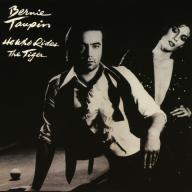John's self-titled 1970 album was the turning point; highlighted by the classic Your Song, it made the singer an emerging superstar and although Taupin received comparatively little notice for his efforts, that same year he cut an eponymous solo LP of his own. Although John's 1971 record Tumbleweed Connection reflected the outlaw themes that so fascinated Taupin as a boy, 1972's Honky Chateau was the team's true commercial breakthrough, topping the American charts on the strength of the smash hits Honky Cat and Rocket Man. Throughout the mid-'70s, John reeled off a remarkable series of Top Ten hits, including Crocodile Rock, Daniel, Bennie and the Jets, The Bitch Is Back, and Goodbye Yellow Brick Road; the first album ever to enter the American charts at number one, 1975's Captain Fantastic the Brown Dirt Cowboy featured Taupin's most autobiographical lyrics to date and launched the chart-topping Philadelphia Freedom. However, relations between he and John were becoming increasingly strained and in the wake of 1976's Blue Moves, the singer began working with other lyricists.
Apart from John, Taupin relocated to Los Angeles and in 1980 issued his third solo album, He Who Rides the Tiger; that same year, he and the singer reunited for 21 at 33, although John continued collaborating with other writers as well. 1983's Too Low for Zero restored their partnership in full, yielding the hits I'm Still Standing and I Guess That's Why They Call It the Blues. Still, despite subsequent chart entries like Sad Songs (Say So Much), Nikita, and Sacrifice, the duo's later work largely failed to recapture the spark of their creative peak. Independent of John, Taupin returned to the top of the charts in 1985 as the co-author of the Starship smash We Built This City, and two years later issued the solo Tribe; in 1988, he also published his memoir, -A Cradle of Haloes: Sketches of a Childhood. Taupin subsequently formed the Farm Dogs, a roots music-inspired group that issued a self-titled debut album in 1986. In the wake of Princess Diana's death the following year, he also rewrote the lyrics of the perennial Candle in the Wind in her honor; performed by John at the royal's funeral, the resulting single became one of the biggest chart hits of all time. ~ Jason Ankeny, Rovi














